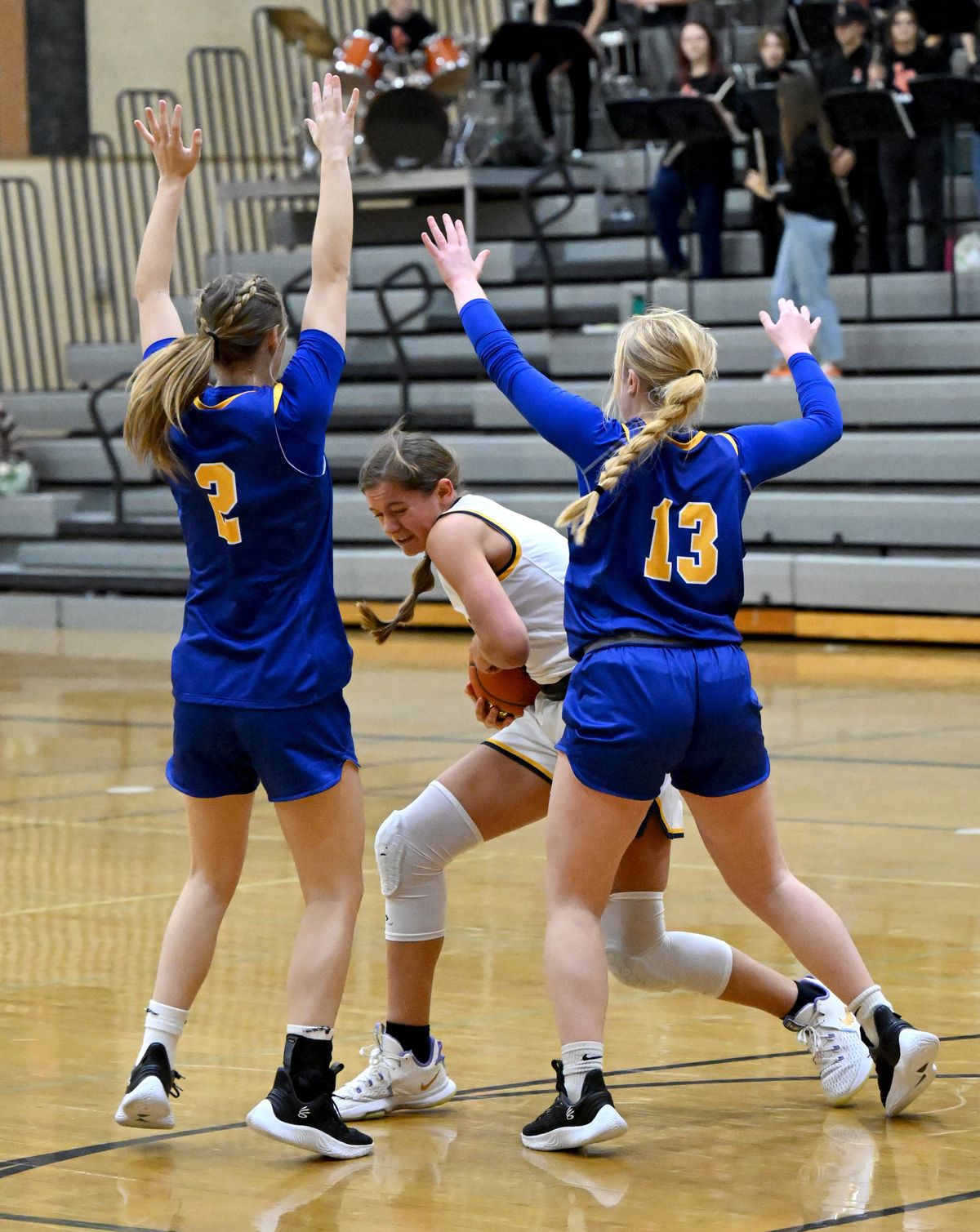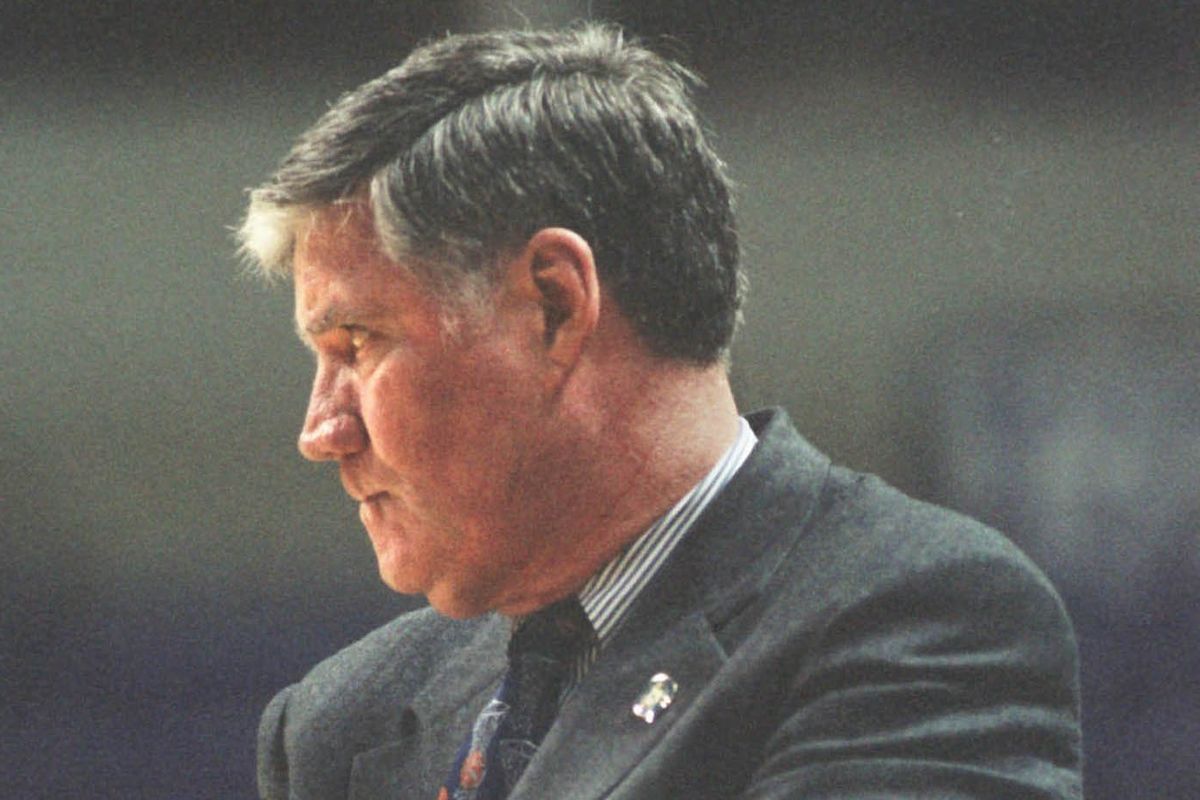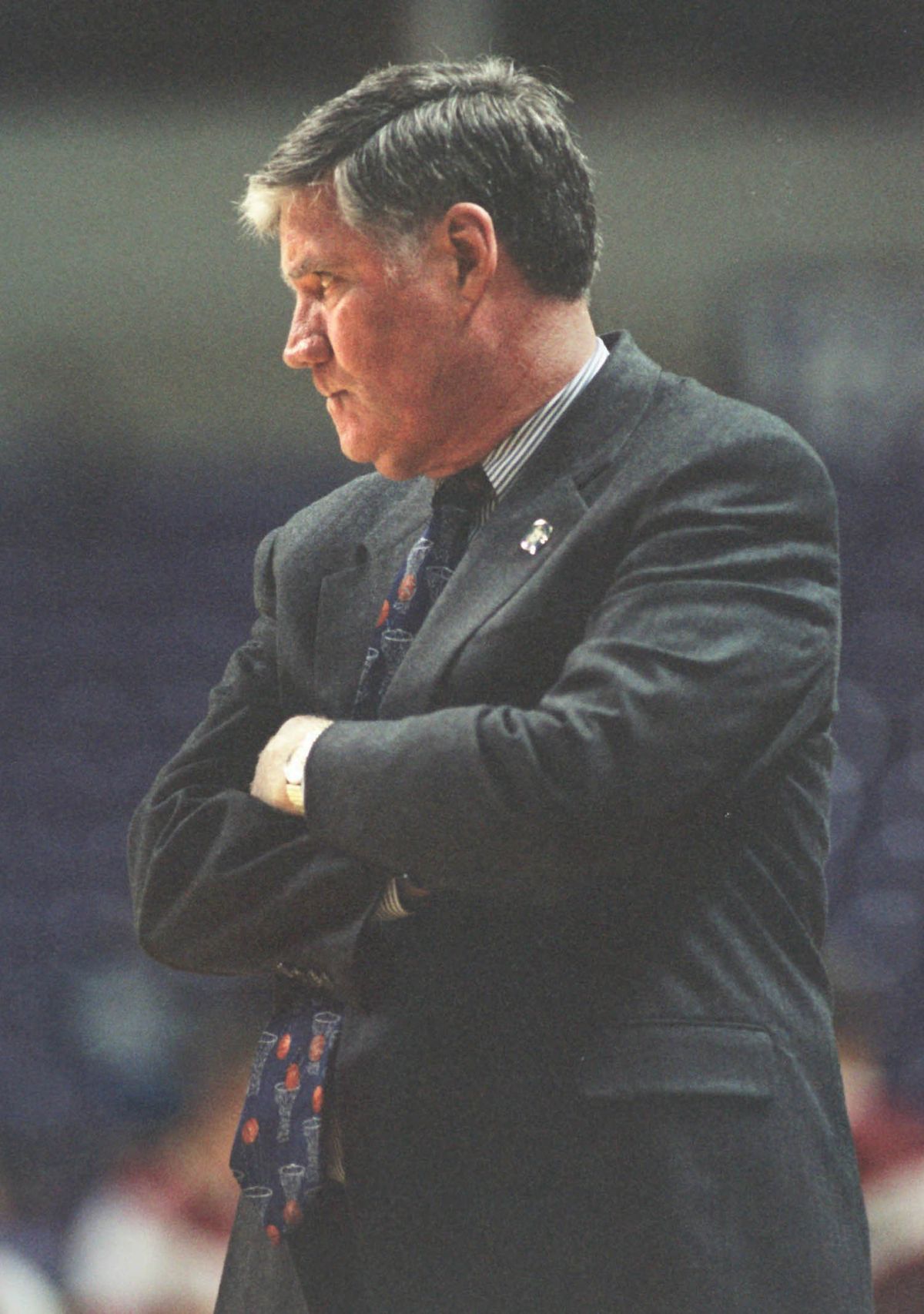The Fitz finale: Annual basketball tournament may be ending, but the legacy of former Gonzaga coach Dan Fitzgerald endures
Dan Fitzgerald, who died 15 years ago, was committed to working with local high school and AAU coaches long after his days of leading Gonzaga basketball were over. (Dan Pelle/The Spokesman-Review)
Jay Humphrey was just out of college, happy to be on board as the junior varsity basketball coach at Central Valley High School but not content to show up at tipoff merely with what he’d learned about the game in his 25 years.
So he made a call to Dan Fitzgerald.
“In those days, you could look up the number for the coach at Gonzaga in the phone book,” he said. “I asked if I could come watch a practice, figuring the worst that could happen was that he’d say no.”
He said yes. More than yes, really. When Humphrey showed up, a manager procured a folding chair, a soda and a copy of the practice plan. The Zags toiled on Fitzgerald’s “flex” offense and between drills he’d come by Humphrey’s perch to ask for his thoughts – with Fitz’s inevitable conversational detours, of course. How’s your team? How’s your dad? How’s … well, you get the idea.
It was a scene repeated maybe a couple of times a week, and with how many high school coaches over the course of a season? A dozen? Two?
“I was amazed he was paying attention to a kid just starting out,” said Humphrey, who went on to head coaching jobs at North Central, University and finally West Valley. “Later, he invites me up to their coaches’ meeting after practice and hands me a beer and gives me a copy of his 1,000 entries into flex, and I’m part of the discussion. I had no idea how much he cared. This was his sport, and he genuinely wanted people to get better.”
That meant everybody, at every level.
On Friday, the 12th – and final – Dan Fitzgerald Memorial Basketball Showcase will tip off at Lewis and Clark High School, with the typical field of Greater Spokane League teams and guests from the West Side and Oregon.
Why the last? Well, everything has a shelf life.
Except perhaps legacies.
Fitz’s legacy will endure beyond the finale of this tournament, thanks to the establishment of a scholarship in his name – now endowed with more than $50,000 from donations and tournament reserves – to be gifted each spring at the Spokane Youth Sports Awards. That legacy belongs, too, to his family and the legion of friends whose love and loyalty still burn 15 years after his death.

Still, that passage of time can be complicating.
It has been 27 years since Fitzgerald stalked a sideline at Gonzaga. Of the 6,000 who fill McCarthey Athletic Center on game nights, not an inconsiderable percentage have forgotten – or never knew – he took the Bulldogs to their first NCAA Tournament in 1995, or brought John Stockton into the program, or won 252 games. Tireless and passionate, he generated notice for a basketball program that when he arrived was barely a blip on the sports page.
The foundational, however, rarely gets feted. And that’s what made the Fitz tournament the most fitting kind of tribute.
Because it can be argued that his most lasting impact, and yet even more in the shadows, came at the grassroots level – starting with those high school coaches dropping by practice.
He had a soft spot for them. He’d been a high school coach in Los Angeles and San Jose, California, and related to the challenges, rewards and stresses of high school coaching. Plus, he’d once lost to a nun, which topped everyone else’s best story.
“It’s so meaningful when you’re a high school coach and there’s a guy in the position Fitz had who’s willing to open the door and not only let you observe, but make you feel like you’re the most important person in the room,” former Shadle Park coach Tim Gaebe said. “There’s a great camaraderie in coaching, and Fitz was the center of that here.”
It hardly stopped there.
After his Gonzaga days, he was open to working out college-bound players privately – if he sensed their commitment was a strong as his. When the local AAU community launched an elite-level camp, Fitzgerald became the centerpiece.
But it was never all about the best players. Just ask the guy who once asked Fitz to come work a practice of fifth-grade girls, or the eighth-grader who saw him in the stands at a Catholic league game.
“There’s a church across the street from the old U-City in the valley,” said Tom Psomas, a long-time AAU board member and Fitzgerald’s close friend, “and once a week during the summer in this small, hot gym he’d show up because another guy with a team had asked him, and he’d say, ‘I’ll do it as long as you come.’ ”
Sometimes his natural enthusiasm and drive made him more than a helper.
“One time I was a coaching an AAU team – a good team – with Steve Stockton,” said Rex Head, “and we were struggling with a zone offense or something, so we asked him to come. Well, he pretty much took over the practice. I’m thinking, ‘Fitz, I was just looking for a couple ideas,’ but his passion takes off – and I loved that about him.”
That passion was never more evident than in his involvement in what became known as “The Fitz Camp,” three days of instruction and scrimmages for the top high school players in Eastern Washington and neighboring states. Getting Fitzgerald involved some 25 years ago was the brainstorm of Ron Benzel, head of the local AAU association at the time. The first one drew more than 100 players, more than a few because of Fitzgerald’s reputation.
In time, many came back in another role.
“After his career was over, I ran into Adam Morrison at a Ferris-Mead game – he was helping Glenn Williams out at Mead,” Benzel recalled, “and he said, ‘I know the Fitz camp is coming up. Can I work it?’ He’d been to it as a player and loved the energy level and loved Fitz and wanted to be a camp coach.”
Every year, the AAU board cut Fitzgerald a check for his work. Every year, he kicked it back to them to help players who might have trouble swinging the expense of a summer traveling team.
Benzel’s son, Erik, was another player whose bond with the camp and Fitzgerald grew strong.
“It took Dan to make this something sustainable,” he said. “He really helped unify and raise the playing level – and the attention level. College coaches gave more notice, and more than just teaching us skills it established that this area could produce players capable of competing even on the national level.
“We got coached-up hard. I always competed, but I don’t think I ever competed as hard as I did in those 2½ days. That was maybe his special talent.”
The younger Benzel saw it 1-on-1 in private workouts with Fitzgerald, too.
“What people need to understand is that he was an unbelievable instructor of the game,” he said. “Breaking down every set, cutting, shooting. I was already a pretty good shooter, but the tips he gave me, understanding the mechanics, allowed me to go to a higher level. And then you get the face time – his way of motivating and inspiring.”
That didn’t necessarily have to come with ball-handling drills.
When Jeremy Templeton was sifting through college possibilities as a Ferris senior, his father Skip – another long-time AAU volunteer – asked Fitzgerald to provide some advice.
“A lot of kids think that it has to be (an NCAA) Division I school or nothing,” Templeton said. “Fitz was frank with him about the possibilities of sitting on the bench somewhere as opposed to playing, and had examples of how kids might have made better choices. Jeremy wound up going to Eastern Oregon and starting for three years and having a great experience, and it was totally the right decision. I think Fitz had some impact in that.”
Naturally, the road of counsel often was pitted with potholes. Fitzgerald rarely navigated a straight line.
“One year, I took my assistants to the old Chapter 11 to meet the weekend before practice started,” Humphrey recalled. “Fitz was in there with somebody, so we wound up at the table – and got absolutely nothing done. But it was a blast.”
When Fitzgerald arrived with his family and a U-Haul more than 50 years ago, he thought Spokane had to be a good basketball town. It wasn’t. That it has become one can be chalked up to many factors – the rise of the Zags, the explosion of Hoopfest, scads of state championships for boys and girls. Even something like the Fitz tournament has made a mark, with former players of his coaching, and their daughters and sons playing.
And then there are the hundreds of volunteers who’ve stepped up to coach and guide – many inspired by the most charismatic volunteer of all.
“Fitz was a giver,” Templeton said. “A guy like that can make all the difference in the world.”




